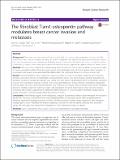The fibroblast Tiam1-osteopontin pathway modulates breast cancer invasion and metastasis
Author(s)
Xu, Kun; Tian, Xuejun; Movassaghi, Mohammad; Kuperwasser, Charlotte; Oh, Sun Y.; Naber, Stephen P.; Buchsbaum, Rachel J.; ... Show more Show less
Download13058_2016_Article_674.pdf (1.854Mb)
PUBLISHER_CC
Publisher with Creative Commons License
Creative Commons Attribution
Terms of use
Metadata
Show full item recordAbstract
Background
The tumor microenvironment has complex effects in cancer pathophysiology that are not fully understood. Most cancer therapies are directed against malignant cells specifically, leaving pro-malignant signals from the microenvironment unaddressed. Defining specific mechanisms by which the tumor microenvironment contributes to breast cancer metastasis may lead to new therapeutic approaches against advanced breast cancer.
Methods
We use a novel method for manipulating three-dimensional mixed cell co-cultures, along with studies in mouse xenograft models of human breast cancer and a histologic study of human breast cancer samples, to investigate how breast cancer-associated fibroblasts affect the malignant behaviors of breast cancer cells.
Results
Altering fibroblast Tiam1 expression induces changes in invasion, migration, epithelial-mesenchymal transition, and cancer stem cell characteristics in associated breast cancer cells. These changes are both dependent on fibroblast secretion of osteopontin and also long-lasting even after cancer cell dissociation from the fibroblasts, indicating a novel Tiam1-osteopontin pathway in breast cancer-associated fibroblasts. Notably, inhibition of fibroblast osteopontin with low doses of a novel small molecule prevents lung metastasis in a mouse model of human breast cancer metastasis. Moreover, fibroblast expression patterns of Tiam1 and osteopontin in human breast cancers show converse changes correlating with invasion, supporting the hypothesis that this pathway in tumor-associated fibroblasts regulates breast cancer invasiveness in human disease and is thus clinically relevant.
Conclusions
These findings suggest a new therapeutic paradigm for preventing breast cancer metastasis. Pro-malignant signals from the tumor microenvironment with long-lasting effects on associated cancer cells may perpetuate the metastatic potential of developing cancers. Inhibition of these microenvironment signals represents a new therapeutic strategy against cancer metastasis that enables targeting of stromal cells with less genetic plasticity than associated cancer cells and opens new avenues for investigation of novel therapeutic targets and agents.
Date issued
2016-01Department
Massachusetts Institute of Technology. Department of ChemistryJournal
Breast Cancer Research
Publisher
BioMed Central
Citation
Xu, Kun, Xuejun Tian, Sun Y. Oh, Mohammad Movassaghi, Stephen P. Naber, Charlotte Kuperwasser, and Rachel J. Buchsbaum. “The Fibroblast Tiam1-Osteopontin Pathway Modulates Breast Cancer Invasion and Metastasis.” Breast Cancer Res 18, no. 1 (January 28, 2016).
Version: Final published version
ISSN
1465-542X
1465-5411